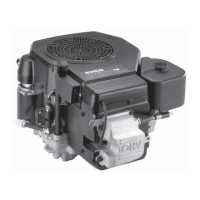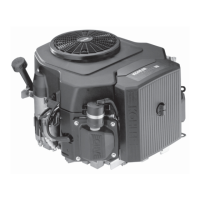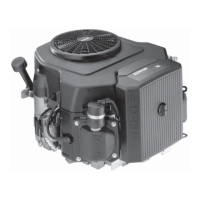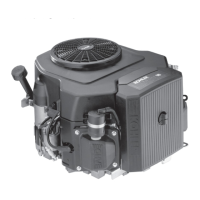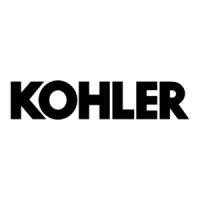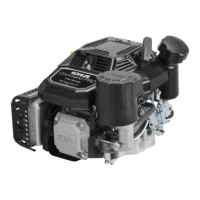Do you have a question about the Kohler CV11-16 and is the answer not in the manual?
Important safety statements and warnings for engine operation and maintenance.
Advice on using clean, fresh, unleaded gasoline and safe storage practices.
Explains model, spec, and serial numbers for engine identification and parts ordering.
Guidance on selecting the correct type and viscosity of engine oil based on temperature.
Schedule of required maintenance procedures at specified intervals for optimal engine performance.
Key technical specifications for the engine models, including power and displacement.
Information on obtaining specialized tools for servicing Kohler engines.
Table of tools used for specific engine diagnosis and repair procedures.
Instructions for creating custom tools for flywheel and crankshaft servicing.
General guide to identifying and resolving common engine problems by checking simple causes first.
Lists potential causes and checks for engines that crank but fail to start.
Identifies common causes of engine overheating, such as clogged cooling areas or improper load.
Outlines reasons for engine power loss, including oil level, air cleaner, and compression issues.
Procedure for performing a leakdown test to assess cylinder sealing and component wear.
Details on the engine's air cleaner system, including paper and optional foam precleaners.
Instructions for daily checks, precleaner, and paper element servicing for the air cleaner.
Emphasizes the importance of keeping air intake and cooling areas clean to prevent overheating.
Safety warnings and recommendations for using gasoline, including fuel type and storage.
Overview of the typical gasoline fuel system components and operation.
Information on Walbro and Nikki carburetors, including adjustment procedures.
Steps to check fuel system components before carburetor adjustment or disassembly.
Explanation of the centrifugal flyweight mechanical governor's function and operation.
Procedure for setting the engine's maximum no-load high idle speed.
Guidance on using the correct type and weight of oil for engine longevity.
Step-by-step instructions for checking the engine oil level before each use.
Procedures for changing engine oil and oil filter at recommended intervals.
Details on the engine's full-pressure oil system, including pump operation and service.
Method for testing engine oil pressure using an oil pressure tester.
Critical safety warning about the tension of the recoil spring in retractable starters.
Step-by-step instructions for replacing the starter rope without full disassembly.
Information on replacing starter pawls, including available repair kits.
Detailed procedure for disassembling the retractable starter, with safety precautions.
Essential safety warning about touching electrical wires or components while the engine is running.
Information on spark plug types, gap settings, and common causes of misfire.
Overview of the magneto ignition system components and their basic operation.
Guide to diagnosing and correcting ignition system problems, including spark and module testing.
Recommended battery specifications and maintenance guidelines for reliable starting.
Information on inertia drive and solenoid shift electric starters, including precautions.
Details on the operation, service, and troubleshooting of inertia drive starters.
Covers UTE, Nippendenso, and Delco solenoid shift starter disassembly and service.
A suggested step-by-step procedure for complete engine disassembly.
Instructions for draining engine oil and removing the oil filter before further disassembly.
Steps for removing governor linkage and the carburetor assembly.
Procedure for removing the valve cover and cylinder head assembly.
Steps for removing components related to the flywheel and fan assembly.
Instructions for removing the oil pan from the crankcase.
Steps for removing the hydraulic lifters and camshaft.
Procedure for separating the connecting rod and piston from the crankshaft.
Explanation of the ACR mechanism, its operation, and benefits for easier starting.
Inspection procedures for crankshaft journals, keyways, and crankpin for wear or damage.
Guidance on checking cylinder bore for scoring, wear, and proper resizing procedures.
Inspection of pistons and rings for damage, wear, and proper installation techniques.
Procedures for checking valve guide-to-stem clearance and reaming guides if necessary.
A suggested step-by-step procedure for complete engine reassembly.
Instructions for installing the governor gear and cross shaft assembly.
Procedure for lubricating and installing the crankshaft into the crankcase.
Steps for installing the piston and connecting rod assembly into the cylinder bore.
Guidance on lubricating and timing the installation of the camshaft.
Procedures for assembling the cylinder head components based on valve train configuration.
Precautions and steps for correctly installing the flywheel and fan assembly.
Final checks and preparations before starting the engine after reassembly.
Recommended procedure for testing the engine on a stand after reassembly.
| Horsepower | 11 HP at 3600 RPM |
|---|---|
| Fuel System | Carburetor |
| Lubrication System | Splash |
| Cooling System | Air Cooled |
| Dry Weight | 60 lbs |
| Fuel Type | Gasoline |
